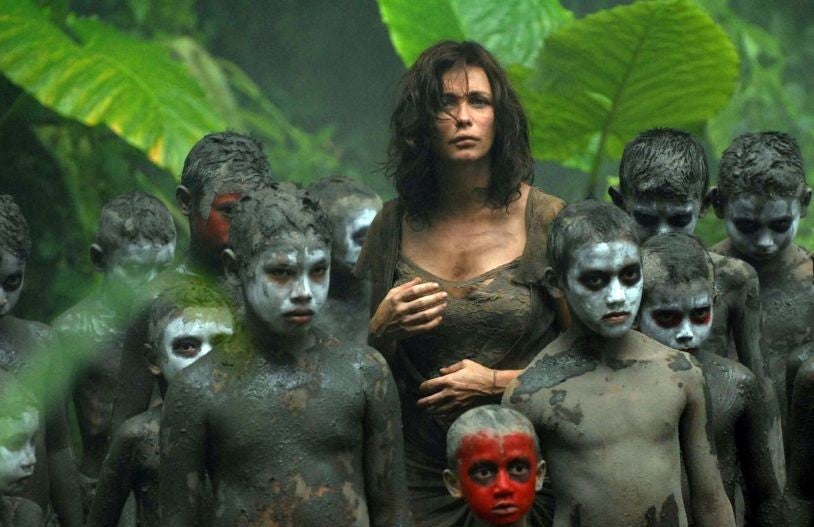Emmanuelle Béart - transgression vamp
The French actress tells Geoffrey Macnab why she's been going mad in a Thai jungle

Your support helps us to tell the story
From reproductive rights to climate change to Big Tech, The Independent is on the ground when the story is developing. Whether it's investigating the financials of Elon Musk's pro-Trump PAC or producing our latest documentary, 'The A Word', which shines a light on the American women fighting for reproductive rights, we know how important it is to parse out the facts from the messaging.
At such a critical moment in US history, we need reporters on the ground. Your donation allows us to keep sending journalists to speak to both sides of the story.
The Independent is trusted by Americans across the entire political spectrum. And unlike many other quality news outlets, we choose not to lock Americans out of our reporting and analysis with paywalls. We believe quality journalism should be available to everyone, paid for by those who can afford it.
Your support makes all the difference.Those who remember the 45-year-old French actress Emmanuelle Béart as the artist's model in Jacques Rivette's La Belle Noiseuse (1991) or as the lovely shepherdess in Manon des Sources (1986) will surely be startled by the figure she casts at the end of her new film Vinyan, caked in mud, surrounded by feral, monstrous children, and close to insanity. She plays a traumatised mother whose son has gone missing in the Asian tsunami. Desperate to get him back, she embarks on a reckless mission into the heart of the Burmese jungle.
Some critics at the Venice Festival were uncomfortable with the way that Vinyan (the title means "evil spirit") deals with subjects as emotive as the tsunami and the disappearance of a child, and with its portrayal of present-day Burma. However, Béart clearly doesn't see the movie as either a drama about political repression or about the grim legacy of the tsunami.
Her character "is the one who survives. Somewhere, she gives up on humanity and she accepts the animal part of herself. That seems to be the only way for her to survive," is how she explains Jeanne's transformation from affluent Westerner to junglewoman. She describes Vinyan as "a voyage – a physical, existential, spiritual and unique voyage."
Her admiration for the film's maverick young Belgian director Fabrice Du Welz is self-evident. She describes him as "transgressive," which seems to be the highest compliment in her lexicon. He made heavy demands on her – often at very short notice. Before one tough scene at the end of a day when she had thought shooting was already over, he visited her in his trailer. "He said he was going to ask me one thing. I said: 'Yes?' He said he wanted me to be crazy. I said: 'What, tomorrow?' He said: 'No, now. We have 20 minutes of light.'"
Béart was to used to working with film-makers who were talented but often traditional. Du Welz, the young horror-movie obsessive from Brussels, was a film-maker in a very different groove.
"Usually, in my other movies, I was the transgressive woman and they were not the transgressive directors. They were filming a transgressive woman without being transgressive themselves," Béart chides the long list of distinguished French film-makers (Jacques Rivette, Claude Sautet, Claude Berri etc) she has worked with. Even François Ozon (who directed her in 8 Women) did not go far enough. She admires Ozon's "perversity" and suggests "he would have been a killer if he wasn't a director," but still says he wasn't provocative in the way that Du Welz was. "We didn't go far enough."
Making Vinyan in the jungles of Thailand was clearly a gruelling experience."Every day, I woke up and said to myself: 'Be brave, don't give up, don't get sick.'" During shooting, she suffered "a very bad" ear infection that stopped her from hearing properly. "But I used it [for the role]."
As a mother herself, she was reluctant to take a role as a bereaved parent. "I just could not do it," she says. "I could not imagine beforehand what pain she felt." Moreover, in her capacity as a Unicef ambassador for France, she had been to Thailand to make a film on child prostitution.
"I thought I would never ever go back but I am glad I did. What I got from Thailand this time was so spiritual, so mystic," she says. "The interesting thing is that they [the Thais] don't see death like we do. When we [in Europe] talk about death, it's taboo. When they talk about death, it's like a continuation of life."

Watch Apple TV+ free for 7 days
New subscribers only. £8.99/mo. after free trial. Plan auto-renews until cancelled

Watch Apple TV+ free for 7 days
New subscribers only. £8.99/mo. after free trial. Plan auto-renews until cancelled
Béart was born in the South of France in August 1963, her father the singer Guy Béart, her mother, Geneviève Galéa, a former model. "I grew up without movies, without TV, without theatre," Béart declares. "There was nothing but nature... goats!" As a kid, she was a troublemaker, being thrown out of various schools. She remains outspoken, taking up various social causes, among them the plight of illegal immigrants in Paris.
Vinyan is among the most provocative roles she has taken. Since the Venice premiere last week, the film has already provoked considerable controversy. Parents of tsunami victims have expressed dismay that the disaster is being used as a backdrop for a supernatural horror movie. Béart, though, has no regrets about making it.
"I knew he [Du Welz] was making his movie and that it was going to be very transgressive, very shocking. But I knew that I was ready to go right to the end."
'Vinyan' will be released later this year
Join our commenting forum
Join thought-provoking conversations, follow other Independent readers and see their replies
Comments